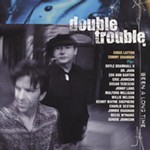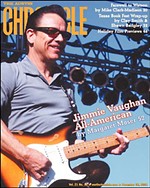God's Paper
Austin-based Publisher Reaches Out to Russians
By Andy Langer, Fri., Sept. 27, 1996
Murdoch's eventual purchase and the Post's return to sleazy-headline status quo meant Hamill would never get the chance to see his dream, although the New Yorker embraced Hamill's assertion that the 150-year tradition of ethnic papers targeting Ellis Island arrivals could indeed become a valuable lesson in modern day journalism. "The best of these papers have been immigration primers," said the magazine, "guides to the mystery and manners of the New World."
Since 1991, the Russian language New Meridian has been a lot like the weekly realization of Hamill's "God's paper" idea -- only its news, features, and assimilation tips are solely geared towards the late-Eighties boom of Russian-speaking immigrants to the U.S. New Meridian targets that post-Cold War influx -- over one million immigrants, 80% of them financed by Russian Jewry supporters -- with a circulation of 30,000 new Russians in 19 states. In fact, ethnic publishing experts say the tabloid has become the must-read complement to the 75-year-old daily New Russian World in Russian immigration hotbeds like Chicago, Dallas and Los Angeles -- not to mention in New Meridian's New York editorial home and Philadelphia printing base. And yet although Austin is the new home for only 120 or so Russian families, with another 100 or so rotating University of Texas students and faculty, it has also become the Meridian's publishing headquarters -- after Russian journalist and socialite turned political refugee Mila Adato and her husband fled New York, Philadelphia, and Dallas for the calmer confines of Austin in 1994.
"I saw potential for the New Meridian, because although three or four papers already catered to the Russian market, they were all very nostalgic," says Adato of the original small, 16-page weekly she purchased. "Nostalgia's fine, and you can make money that way too, but without focusing on everyday help, you're simply extending the barriers that already plague new immigrants. So while most of the Russians speak English, they don't read English papers. They just don't feel knowledgeable enough to read English, and that lack of news and tips creates a tremendous barrier between the Russian mentality and the American lifestyle."
Adato says her paper, now typically 48 pages, prides itself on a USA Today-style news briefing on major national and international news, with increased business, politics, and arts feature coverage. "Mostly the news is philosophical or about general knowledge," says Adato of New Meridian's continuing coverage of legal, marital, financial, contraception/abortion, and medical issues. But the more obvious long-term goal of Meridian's longer features and Adato's "Note From the Publisher" seems to be to reinforce appreciation for North American values and to achieve true assimilation.
"There's 1.7 million Russian people in America, and I would say over half are still in Russia in their minds," says Adato, who herself only just settled in America in 1989. "They feel limited by the cultural differences, even with the services and new opportunities provided for them. In Dallas, I spent a lot of my available time with the Jewish Community Center, driving old ladies around town and helping their Holocaust Museum. It was then that I discovered how ungrateful many of them are. `What do you mean the pool is not working today?' they'd say. That's how I decided to lean towards the articles on immigration and assimilation. It really bothers me that the Russians could seemingly forget the time and money that faceless people spent to bring them here. Ungratefulness is my biggest concern."
Adato's own appreciation for immigration, she says, stems from being part of the Russian upper class and still being deported three times from Mexico and the United States -- mostly, she believes, because only her mother was Jewish, a fact that disqualified her for most immigration programs. But because Adato was already fluent in English upon her eventual arrival, with experience as a Russian pamphlet journalist and as a translator for the Moscow government -- "I finally became convinced they were all crooks" -- she quickly found work in New York and Philadelphia editing other smaller Russian-language publications. By 1991, Adato was asked by the former New Meridian publishers to buy them out. She agreed, and started her own refocused campaign to reach the 300,000 New York immigrants and 60,000 new Philadelphia residents. With a percentage of that regional readership, her new Austin base and the accompanying connections with the Houston, Austin and Dallas Jewish Community Centers, New Meridian has grown to the point where readers come searching her out. "With the Russians, the community is so tight-knit that word of mouth can create a flood," she says. "When I started in Dallas I used to drop only 10 or 12 papers at Russian businesses and in just one week I had all the area's possible subscribers."
Unfortunately, New Meridian comes printed only in Russian -- something that could delay Russian immigrants from using English for their word-of-mouth tips. Adato herself concedes that New Meridian may be in part counterproductive to the ideal assimilation process, but hastens to add that several advertisers have begun to fare well with bilingual ad copy. "They deliberately don't want to read English," she says, "But Russian people are readers by nature, so this is the way to get through." Adato says Russian people are also fanatically loyal readers, and that by offering free personals and classified ads, and by printing her number for 24-hour phone calls from readers, Adato has established a readership that she considers borderline rabid.
"Last month, the press in Philadelphia broke and we needed to send subscribers two issues at once," says Adato -- who sports 5,300 subscribers, distributing the bulk in urban delicatessens, pharmacies and groceries with a 50-cent cover price. "For a week I had a disastrous flood of phone calls. I was here in Austin trying to smooth over this horrible situation, but learning just how devoted my readership is. And then they'll just call with simple questions, like how much Tylenol to give their baby. I'm like their home page, which is how I can keep up from here."
Editorially, Adato believes, her focus on social issues and timeless assimilation issues has created a readership that saves the newspaper, rereads articles, and files them for reference material. The result, she says, is that she can offer merchants an advertising pitch not unlike that of any other alternative weekly -- a longer shelf life and more consistent readership than the daily can offer. (The bulk of Adato's advertising is for lawyers, telephone companies and mail-order book and video companies, and she says services seem to fare better than products.) Better yet, Adato says, her advertiser feedback and marketing studies have shown that the Russian immigrants are perhaps spenders by nature -- a 7-Eleven is inherently more interesting than a bread line.
"The Russian consumer is very unique, because the mentality is to spend everything and even more," says Adato, who adds that features on avoiding credit card debt have become a popular reoccurring New Meridian topic. "They've been deprived of so much, they want to get it all now. It can be hard for the families, but it's one of the things they have to learn the hard way."
Loyal readers and big spenders are proving to be as good for Adato's publishing group as for her advertisers. She's been able to hold off 24 new weekly competitors in the last year alone, and has kept the lead in a race between a total of 42 Russian weeklies. "There's a common misconception that it's easy to make money in this business," says Adato of the upstart papers offering a full page of advertising for $20. "Time and time again, they come in with low prices, a cheap product, and eventually vanish."
And in keeping with her positive outlook on Russian entrepreneurship, Adato says one of her best avenues for beating the competition to the readers, and at the same time gathering international news, has been her new Russian barter program. "It's very important for the paper to get back to Russia, so they can see what's going on for their family and friends in America," says Adato. "So I have correspondents in Russia who send the news here in exchange for the rights to distribute it there and keep the profits. I'm the only one that does it that way."
Stateside, from Austin, Adato translates English copy and keeps in regular phone and e-mail contact with her New York editorial team -- with the threat of surprise New York visits becoming rarer as she grows to trust the instinct of her staff. "Originally, they had a knack for the news, but no social skills," says Adato. "They'd speak like two words to callers, and now they're constantly pitching advertisers because I told them they'll get a percentage of that too. To be fair, I believe I, too, should be offering the financial reward to get into the American market."
So while Adato has recently branched into other segments of the American market herself with an Austin realtor referral service, she's also planning on using New Meridian as a springboard to publish a series of Russian espionage novels and an original theatrical musical. As for the future of New Meridian, she says even with a current immigration freeze, her "God's paper" approach to assimilation and immigration should nicely run itself.
"The immigrants can feel more pride here for their nationalism and settle into American life," she says. "But while they'll still be amazed they can practice any religion they want, there's still the knowledge and comfort of their national languages that'll bring them back to the Russian-language newspaper. The New Meridian will be there, and I'll be in Austin waiting for them."
Got something to say on the subject? Send a letter to the editor.








